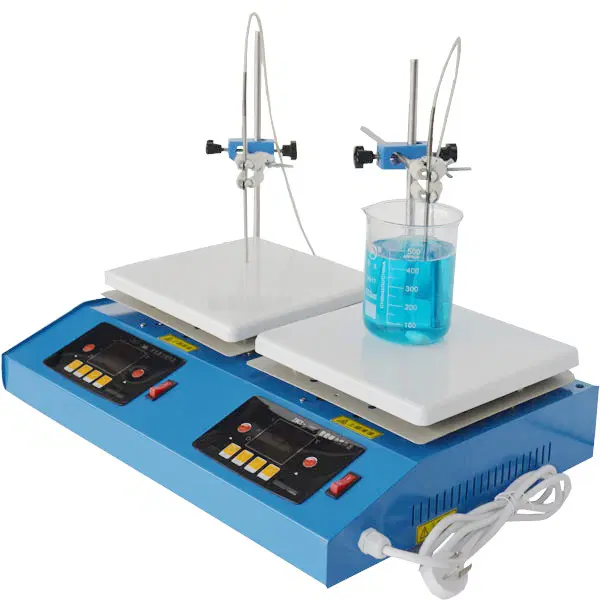The laboratory hot plate is an essential tool in any scientific research environment. This device allows for the precise and controlled heating of liquids and substances, which is crucial for a wide range of experiments.
In this article, we will explore how to use a laboratory hot plate effectively, provide practical tips, and offer step-by-step tutorials to ensure you get the best possible results. Additionally, we will highlight the latest trends in medical technology and recent advances in laboratory research that have significantly improved these tools.
Understanding the Basic Functions of the Hot Plate
The laboratory hot plate is designed to provide a constant and controlled heat source. The basic functions include temperature adjustment, a timer, and, in some advanced models, magnetic stirring. It is essential to familiarize yourself with these functions before using the hot plate.
To adjust the temperature, most hot plates have a dial or digital control. The temperature should be carefully selected according to the type of experiment being conducted. An incorrect setting can affect the experiment’s results. On the other hand, the timer is useful for experiments requiring heating for a specific period. Magnetic stirring, if available, allows for mixing solutions while heating, ensuring an even heat distribution.
Initial Setup and Safety
Before turning on the hot plate, it is crucial to perform a safety check. Ensure the device is on a stable and level surface, away from flammable materials. Check that the cables are in good condition and that the power outlet is suitable.
Safety also involves using personal protective equipment, such as gloves and safety glasses. Additionally, it is always advisable to have a fire extinguisher nearby. If the device has any safety features, such as automatic shutoff in case of overheating, make sure they are activated. Proper setup and safety measures can prevent accidents and ensure a safe working environment.
Step-by-Step Guide to Heating Substances
Step 1: Preparing the Sample
Before heating any substance, it is essential to properly prepare the sample. Use containers compatible with heat, such as glass flasks that can withstand high temperatures. Ensure the sample is clean and free from contaminants that could affect the experiment.
Step 2: Placing and Adjusting the Temperature
Place the container with the sample in the center of the hot plate. Adjust the temperature according to the experiment’s requirements. For greater precision, use a thermometer to monitor the actual temperature of the liquid, as there may be a difference between the set and actual temperatures.
Step 3: Continuous Monitoring
During heating, it is crucial to continuously monitor the sample. Observe any changes in color, consistency, or bubble formation, as these can be important indicators of the experiment’s progress. Adjust the temperature if necessary to maintain optimal conditions.
Practical Tips for Efficient Heating
Using Magnetic Stirring
Magnetic stirring is a valuable feature that helps to distribute heat evenly in the sample. Use a magnetic stir bar and ensure it is correctly centered in the container. Activate the stirring function and adjust the speed according to the experiment’s needs. This is especially useful for solutions that tend to separate or precipitate during heating.
Avoiding Overloading the Hot Plate
Do not overload the hot plate with too many containers or heavy substances. Overloading can lead to uneven heating and damage the device. Always follow the manufacturer’s recommendations regarding the maximum load capacity.
Maintenance and Care of the Hot Plate
Regular maintenance of the hot plate extends its lifespan and ensures optimal performance. After each use, clean the surface with a damp cloth to remove any residue. Avoid using abrasive cleaning products that can damage the surface.
Periodically inspect the device, especially the electrical components and temperature controls. If you notice any issues, such as temperature fluctuations or unusual noises, consult the user manual or contact the manufacturer for technical assistance. Proper maintenance not only ensures safety but also the accuracy of experimental results.
Recent Advances and Trends in Medical Technology
Advanced Heating Technology
Recent advances in heating technology have significantly improved laboratory hot plates. Newer models incorporate more precise temperature control systems, such as the use of infrared sensors, allowing for more exact and uniform heat control. These advances are particularly important in medical research, where even small temperature variations can affect results.
Integration with Laboratory Software
Another emerging trend is the integration of hot plates with laboratory software. This integration allows for remote control and monitoring of the device via a computer or mobile device. Researchers can program heating cycles, record temperature data, and receive alerts if there are deviations, improving efficiency and accuracy in laboratory research.
Conclusion
Laboratory hot plates are indispensable tools in scientific research. With the right knowledge and application of correct techniques, precise and reproducible results can be obtained. We hope this guide has provided valuable and practical information on how to use a laboratory hot plate effectively.
Stay informed about the latest trends in medical technology and recent advances in laboratory research to continue improving your laboratory practices.
If you’re seeking a blend of innovation and quality, you’ve come to the right place. At https://kalstein.africa/category-product/laboratory-line/hotplates-and-hotplate-stirrers/ we offer you the luxury to explore our exclusive catalog of laboratory equipment. We manufacture each piece of equipment with a level of excellence. Our intuitive and agile online shopping channels are designed for your convenience, ensuring the friendliest prices. Don’t hesitate any longer, we bring science to life, it’s time to become part of our community. https://kalstein.africa/

